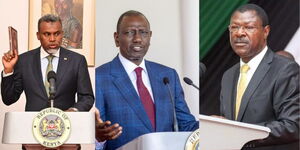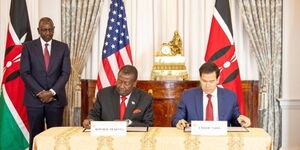Parliamentary Budget Office in its 2023 report noted why the Kenyan shilling has been on a free fall against the dollar.
While Ruto’s government has been castigated by the opposition for the depreciating shilling and subsequent rise in the cost of living, the report revealed how the current fall was set in motion by events that happened in the 2020/2021 financial year.
The report singled out three factors that led to the depreciation of the shilling against the dollar which largely exonerated the Kenya Kwanza government.
“The US Dollar appreciated against the Kenyan Shilling from 109.8 in January 2021 to 123.9 in January 2023.
“Similarly, the Kenyan Shilling has also depreciated against the Pound Sterling from 149.8 in January 2021 to 151.3 in October 2022,” the report captured the depreciation.
While the Azimio coalition has blamed Ruto for the economic turmoil occasioned by a weak shilling, the report indicated that Kenya's weak currency against the dollar was not a unique case.
“Most countries across the world have experienced a weakening of their currency because of capital flight,” the report explained.
Capital flight is when money or assets rapidly flow out of a country due to an event of economic consequence like bad monetary policies from the government.
Capital Markets Authority (CMA) on January 31, 2023, explained how capital flight in recent years had affected the Kenyan economy.
“Foreign investors are shying away from Kenya’s capital markets due to a lack of adequate foreign exchange to invest in securities at the Nairobi bourse and repatriate accrued dividends and returns,” CMA warned.
The report in a further exoneration of Ruto’s government revealed that the country had rapidly depleted its foreign exchange reserves from 2021.
“The Shilling has also been weakened by a deterioration in the foreign exchange reserves with the months of import cover declining from 4.9 in January 2021 to 3.9 in January 2023,” the report stated.
Import cover is the number of months of imports a country can cover using its international reserves and is used as an indicator of the country’s currency stability.
According to the report, the Kenyan shilling was also hard-hit by servicing a huge external debt that is majorly US dollars dominated.
Ruto inherited an external debt of Ksh10 trillion from his predecessor Uhuru Kenyatta and the government has continued to repay the debt which has greatly weakened the shilling.












